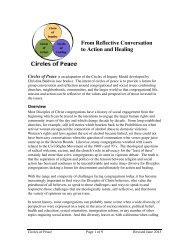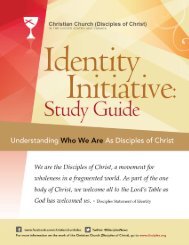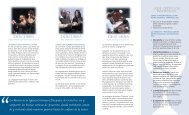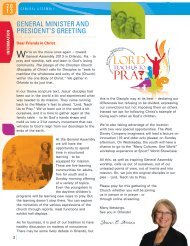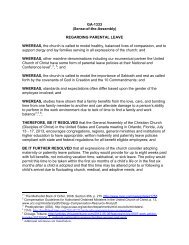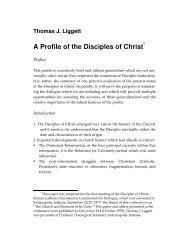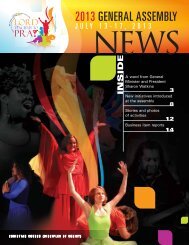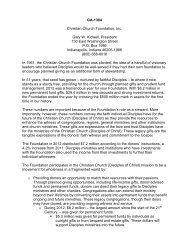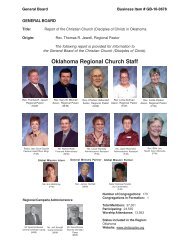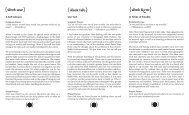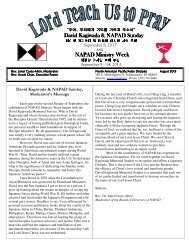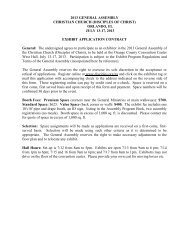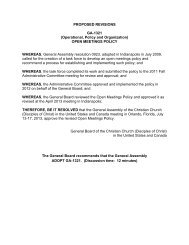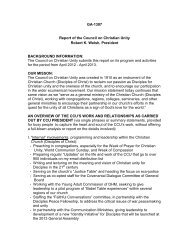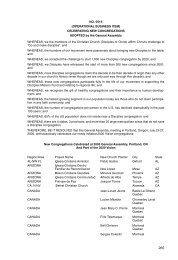RESOURCING THE CHURCH FOR ECUMENICAL MINISTRy A ...
RESOURCING THE CHURCH FOR ECUMENICAL MINISTRy A ...
RESOURCING THE CHURCH FOR ECUMENICAL MINISTRy A ...
You also want an ePaper? Increase the reach of your titles
YUMPU automatically turns print PDFs into web optimized ePapers that Google loves.
eligious and political world. Early followers of<br />
Jesus saw themselves as vulnerable to persecution<br />
and suffering from without; at the same time, Paul,<br />
Irenaeus, and others depicted the communities they<br />
knew as reliable, if earthen, vessels that could bear<br />
the grace and glory of God.<br />
As persecution lessened and Christianity gained<br />
status in society, theologians and church leaders<br />
increasingly became concerned with immorality<br />
and laxity in the church, and ultimately, with<br />
securing the church as a means of salvation. Could<br />
churches bear God’s grace when truth and falsehood<br />
were mixed within them? Faced with internal<br />
threats more than external ones, theologians and<br />
church leaders began to stress the unity of the<br />
church and to develop strategies of institutional,<br />
dogmatic, and moral invulnerability. At the turn of<br />
the fifth century, Augustine introduced the distinction<br />
between the visible and invisible church as<br />
a way to affirm that actual churches exhaust neither<br />
the reality of Christian communion nor the glory of<br />
God. At the same time, Augustine’s thought<br />
consolidated the authority of the church. He<br />
pictured the visible church as a properly-ordered<br />
institution that minimized discord and bolstered<br />
human unity through the hierarchical rule of the<br />
church.<br />
I’m not suggesting that we can divest ourselves of<br />
hierarchy (or heteronomy) by simply returning to<br />
Paul’s vision of earthen vessels or by somehow<br />
rejecting institutions and order. Moreover,<br />
Augustine’s theology broadened the horizon of<br />
transformation to the whole world and to all history—<br />
and that gain ought not to be lost. However,<br />
hierarchical authority, especially heteronomous<br />
authority, may rightly prompt a hermeneutics of<br />
suspicion. Contemporary Disciples should ask: Is<br />
unity serving institutional stability or the transformation<br />
of life before God? Is unity serving to<br />
bolster invulnerability rather than to attune us to<br />
creaturely vulnerability and a living God? Does the<br />
affirmation of unity grow from a sense of human<br />
vulnerability to devastation—and to transformation—<br />
or does it stifle awareness of shared creaturely plights<br />
and possibilities?<br />
Accordingly, we might distinguish the question of<br />
the unity of the church from Christian unity, and<br />
then interpret Christian unity in relation to the<br />
unity of humanity. The Bible gives us many pictures<br />
of the unity of humanity, one being that we are earth<br />
creatures, fashioned from dust and the bones of<br />
Culp • Christian Unity, Prophetic Witness, and the Unity of Humanity<br />
30<br />
others. Paul’s teaching that human creatures are<br />
capable of bearing the grace and glory of God in the<br />
clay vessels of shared life and worship remains<br />
crucial. Along with these biblical depictions, we<br />
must also attend to basic human needs. There are<br />
some universals: all persons need food, shelter,<br />
clothing, care, community, and dignity. Both the<br />
Bible and human need attest that we humans are<br />
creatures who are susceptible to pain, hunger,<br />
suffering, harm, and death; we are also susceptible<br />
to transformation. Such needs unite us and<br />
moreover, must test any notion of Christian unity.<br />
That responsiveness to creaturely need ought to test<br />
the adequacy of shared faith, is not a new affirmation.<br />
The words of the prophets and of Matthew<br />
28 come to mind. Likewise, Martin Luther trained<br />
his attention to the hungry poor and contrasted<br />
their plight with that of the wealthy church. Luther<br />
rejected any notion of the church or of Christian<br />
unity that was built on the consolidation of visible<br />
organizational and clerical authority. “The church<br />
is a high, deep, hidden thing which one may<br />
neither perceive nor see, but grasp only through<br />
faith, through baptism, sacrament, and Word,”<br />
Luther wrote. He continued: “Human doctrine,<br />
ceremonies, tonsures, long robes, miters, and all<br />
the pomp of popery only lead far away from it into<br />
hell—still less are they signs of the church. Naked<br />
children, men, women, farmers, citizens, who<br />
possess no tonsures, miters, or priestly vestments<br />
also belong to the church.” 3 Although divine grace<br />
and glory can never be fully known, Luther taught<br />
that Christian people—humble and privileged<br />
alike—can be confident that the fullness of grace is<br />
hidden in God rather than contained in church<br />
hierarchies and ceremonies.<br />
Luther contrasted the structural unity of churches<br />
with a spiritual unity in Christ. 4 He taught that: 1)<br />
true Christianity is neither primarily a structure<br />
nor an institution; it is a spiritual communion of<br />
one faith; 2) “external matters of worship” such as<br />
vestments, rites, special masses, are not essential to<br />
Christianity; what the scriptures and the creeds<br />
teach is faith alone, which is inward and spiritual;<br />
3) Christianity is not built up to the pope as its head,<br />
only Christ can be the source of life for the body;<br />
and finally, 4) Christian faith is not limited by the<br />
inequalities of material bodies—that is, those who<br />
are stronger, healthier, richer, or more powerful are<br />
not superior Christians. Luther’s insistence that<br />
Christianity is not determined by the inequalities of



